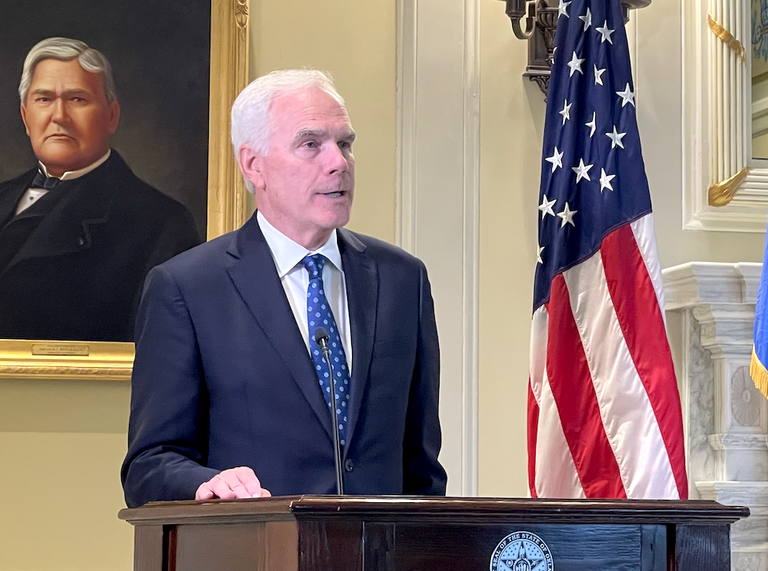
Good Government
Ray Carter | September 15, 2021
Oklahoma AG opposes federal control of elections
Ray Carter
Oklahoma Attorney General John O’Connor has joined 22 other state attorneys general in vowing to fight in court a proposed law promoted by congressional Democrats that would significantly federalize elections.
In a Sept. 13 letter sent to congressional leaders, O’Connor and his fellow attorneys general warned that the proposed “John Lewis Voting Rights Advancement Act” (H.R. 4) would have “devastating impact” on state election systems.
“The bill, as introduced, would allow the United States Department of Justice to usurp the authority states rightly possess over their own elections, essentially federalizing the election system,” the attorneys general stated. “If these provisions are enacted, rest assured that the undersigned will aggressively defend our citizens’ rights to participate in free and fair elections without unconstitutional federal intrusion.”
The letter noted that the proposed law would require states to receive federal preclearance to implement voter-identification requirements and voter-list maintenance, declaring the proposed law would therefore “overturn common sense election integrity reforms” that have already been declared constitutional by the U.S. Supreme Court and that have been “enacted in most states, and of which 80% of Americans support.”
The state attorneys general warned that the proposed federal law would also establish new requirements for vote-denial claims, which they said would “open the flood gates to litigation in states as opponents of secure elections try to overturn common-sense election laws in court or force state election officials to concede, settle, or abandon their election integrity efforts.”
The letter noted that the U.S. Constitution grants states the primary role of establishing the time, place, and manner of holding elections for senators and representatives.
“H.R. 4 seeks to flip this Constitutional mandate on its head, turning the Department of Justice into a federal ‘election czar,’ wielding the power to challenge any new or existing election law based on the whims of the party in power and its desire to manipulate election laws to increase its chances to remain in power,” the letter stated.
The increased federal control over state and local election laws would occur without “any finding of intentional discrimination,” the letter noted.
The Voting Acts Right of 1965 required federal preapproval of election regulations in states with a known history of voter suppression that targeted racial minorities. However, in its 2013 decision in Shelby v. Holder, the U.S. Supreme Court held that preclearance requirements could not be maintained based on now-outdated data from the 1960s.
O’Connor and other attorneys general said H.R. 4 is an attempt to do an end-run around that 2013 U.S. Supreme Court ruling, but they said the bill does not address the biggest issues facing election systems today, noting minority registration and turnout in formerly preclearance counties has been flat or increasing relative to other counties not covered by the 1965 law’s requirements.
“Today, the main concern among citizens is no longer voter discrimination, it is in preventing voter fraud, safeguarding the right to vote, and ensuring that every legal vote is counted undiluted by illegal votes,” the attorneys general wrote.
The nearly two dozen state officials called the legislation “a misguided, clumsy, and heavy-handed effort to circumvent Supreme Court decisions, state sovereignty, and the will of the people.”
The letter was issued from the office of Indiana Attorney General Todd Rokita. Others signing the letter along with O’Connor were the attorneys general of Alabama, Arkansas, Arizona, Florida, Georgia, Idaho, Kansas, Kentucky, Louisiana, Mississippi, Missouri, Montana, Nebraska, New Hampshire, Ohio, South Carolina, South Dakota, Tennessee, Texas, Utah, and West Virginia.
O’Connor’s letter is not the first instance in which an Oklahoma official has spoken out publicly against proposed federal legislation that would overhaul elections.
In June, Oklahoma’s top election official warned that passage of a similar Democratic measure in the U.S. Senate would lead to “chaos.”
In a letter sent to Oklahoma’s two U.S. senators, Oklahoma State Election Board Secretary Paul Ziriax warned that S. 1, titled the “For the People Act of 2021,” represented “an unnecessary (and constitutionally dubious) federalization of election administration policy that would negatively impact our ability to administer fair and secure elections in Oklahoma.”
Among other things, that federal bill would legalize “absentee ballot harvesting” and allow third parties to collect absentee ballots from voters and deliver them to state authorities. That practice has been associated with fraud and resulted in election results being overturned by courts.
Ziriax said the Senate legislation would also make it “virtually impossible to verify the identity of in-person and absentee voters” and make it impossible for the state of Oklahoma to certify election results within a week of an election as now required by state law.

Ray Carter
Director, Center for Independent Journalism
Ray Carter is the director of OCPA’s Center for Independent Journalism. He has two decades of experience in journalism and communications. He previously served as senior Capitol reporter for The Journal Record, media director for the Oklahoma House of Representatives, and chief editorial writer at The Oklahoman. As a reporter for The Journal Record, Carter received 12 Carl Rogan Awards in four years—including awards for investigative reporting, general news reporting, feature writing, spot news reporting, business reporting, and sports reporting. While at The Oklahoman, he was the recipient of several awards, including first place in the editorial writing category of the Associated Press/Oklahoma News Executives Carl Rogan Memorial News Excellence Competition for an editorial on the history of racism in the Oklahoma legislature.